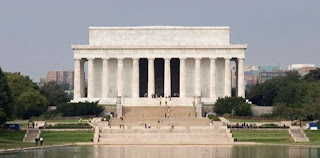 |
| Lincoln Memorial |
In this post, I show how King’s oratory, and his advocacy of
African American rights, arose from principles of Christian faith. His thesis
was that, if African Americans could obtain voting rights, their other rights
would be assured. He noted that the courts had upheld African American rights
in the Brown versus Board of Education case, but that the executive and
legislative branches were failing. “Give us the ballot,” he said, “and we will
no longer have to worry the federal government about our basic rights.”
Link: A Biblical Imperative in "I Have a Dream"
Religious thought and imagery dominated King’s "Give Us the Ballot" speech. For
example, drawing on his extensive knowledge of Mohandas Gandhi, King said: “We
must meet hate with love. (Yeah) we must meet physical force with
soul force.” Then, seamlessly drawing this thought into the Judeo-Christian
scriptures, he continued: “There is still a voice crying out through the vista
of time, saying: ‘Love your enemies (Yeah),
bless them that curse you (Yes), pray
for them that despitefully use you.” (Those last two phrases referred to the book
of Isaiah 40:3 and the Gospel of Luke, 6:27-28, from the King James Bible.)
King then drew on a standard three-way Christian concept of
love, which arises from the three Greek words for love: “Now, I’m not talking
about a sentimental, shallow kind of love.” He denied that he was “talking
about eros, which is a sort of
aesthetic, romantic love.” Instead, he clarified:
“I’m not even talking about philia, which is a sort of intimate affection between personal friends. But I’m talking about agape. (Yes sir) I’m talking about the love of God in the hearts of men. (Yes) I’m talking about a type of love which will cause you to love the person who does the evil deed while hating the deed that the person does.”
Warning the
massive audience that agape prohibited vengeance, he said that oppression
must instead be met with love:
“There is another warning signal. We talk a great deal about our rights, and rightly so. We proudly proclaim that three-fourths of the peoples of the world are colored. We have the privilege of noticing in our generation the great drama of freedom and independence as it unfolds in Asia and Africa. All of these things are in line with the unfolding work of Providence. . . . We must not seek to use our emerging freedom and our growing power to do the same thing to the white minority that has been done to us for so many centuries.”
Re-emphasizing the theme of love, King said that “God is not interested merely in freeing black men and brown men and yellow men, but God is interested in freeing the whole human race.” But this agape, this love, was not a love of weakness, but a love of goodness:
“And those of us who call the name of Jesus Christ find something of an event in our Christian faith that tells us this. There is something in our faith that says to us, ‘Never despair; never give up; never feel that the cause of righteousness and justice is doomed.’”
And he then quoted
Thomas Carlyle: “No lie can live forever.”
Although, yes, Christianity
differs from other religions, I am inspired rather than offended that King
found common ground between the Hindu concept of soul force and the Christian
concept of agape. We are, after all, more alike than different. That which is good is good everywhere.
Let us compare King’s Christianity with the version of Christianity that dominates the mass media today: a Christian Right that preaches so loudly that Christians can triumph only by stomping on their enemies, and which upholds President Donald Trump’s overt racism in the name of Christianity. Too often, I hear Christian preachers talking about a war between Christianity and the liberal community, a war that can be won only by destroying the supposed enemy. Indeed, while the Christian Right continues to preach a cold, irate version of Christianity that I’ve never encountered in the Bible, it is good for us to remember that wise preachers can uphold the Christianity of love, justice, and compassion. Martin Luther King, Jr.’s rhetoric is not merely eloquent because of his fine language, but also of the depth of his thought.
Link: Paula White Prays Against Trump's Enemies
That is why I hope
to write a subsequent blog post to discuss King’s use of parallel language in
this magnificent and often-forgotten speech. King’s political views and
language alike reflected his values. Stay tuned!
P.S. King gave "Give Us the Ballot more than 60 years ago, when generic terms like “he” instead of “he and
she,” and “mankind” instead of “humankind,” were often accepted without question. I
am confident that, if King had been speaking today, he would utter more
inclusive language.
Image: National Park Service
No comments:
Post a Comment